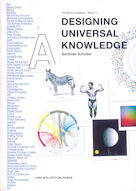Knowledge is power. If one possesses a collection of the ‘universal knowledge’ of the world,
one has ultimate power. Establishing comprehensive, global collections of knowledge
already fascinated mankind thousands of years ago. Today, modern communication and information
technologies offer quick and prompt collecting, high memory capacities and wide-ranging access.
In addition, globalization and the Internet advance a mentality which moves away from
the local and regional towards the international and universal. Collections of knowledge,
such as archives, encyclopaedias, databases, libraries, also follow this trend.
They are engaged in a race against time in both the technological and creative area.
Their clearly formulated aim is to establish for us a complete and up-to-date collection of ‘universal knowledge’.
• Who is collecting the world’s knowledge?
• How are knowledge archives structured and designed?
• Who determines the access to knowledge?
• What knowledge entails power?
